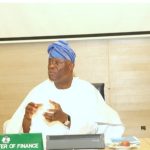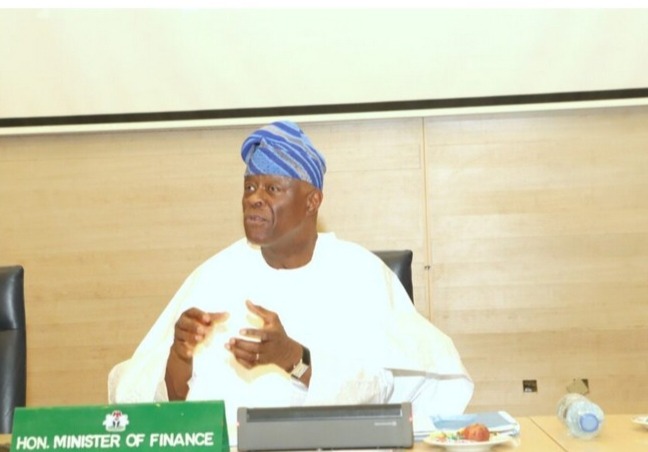Senate erupts as Edun seeks executive session on fuel subsidy proceeds
Senate erupts as Edun seeks executive session on fuel subsidy proceeds
Orders NOA, NAN to rework 2025 budget proposals
• Reps worried over low release of funds to environment ministry
Drama unfolded at the National Assembly yesterday as Finance Minister Wale Edun faced intense questioning from senators during a hearing on the performance of the 2024 budget and the 2025 appropriation bill .
The session, intended to provide clarity on fiscal planning, quickly escalated into tension, prompting Edun to request an executive session. This move further agitated lawmakers, especially as journalists were asked to leave.
The Senate Appropriation Committee, chaired by Senator Solomon Adeola Olamilekan, had invited Edun, who also serves as the Coordinating Minister of the Economy, to address critical concerns regarding budget transparency, capital expenditure performance, and the utilisation of funds saved from the removal of the fuel subsidy.
In his remarks, Edun provided vague responses, prompting senators to demand specific figures. Questions focused on how much had been saved from the fuel subsidy removal and the actual performance of the 2024 budget.
Senator Abdul Ningi (Bauchi Central) expressed frustration, asking pointedly, “How much has truly been saved from the removal of the subsidy, and where has the money gone? What is the current budget performance? These details are critical for our deliberations and for informing the public.”
Other senators joined in, raising concerns about debt servicing, revenue projections, and the implications of extending the 2024 budget’s implementation on the economy.
Ningi emphasised the need for clear and detailed figures, stating, “On the removal of fuel subsidies, we have not been told how much has been saved or how these savings have been utilised. Similarly, debt servicing remains a grey area. How much debt did we service in 2024, and what are the projections for 2025?”
Senator Adetokunbo Abiru highlighted issues with Government-Owned Enterprises (GEOs), acknowledging improvements in revenue collection but raising questions about independent revenues and the Nigerian Liquefied Natural Gas (NLNG) dividend. He also flagged the underperformance of capital expenditure, which he identified as critical for economic growth.
Chief Whip Senator Tahir Monguno criticised the “bottom-up approach” policy, which centralised payment processes under the Office of the Accountant General. He argued that the policy introduced bureaucratic delays and created opportunities for corruption, urging a reevaluation to facilitate more efficient budget implementation.
Minority Leader Senator Abba Moro expressed concerns over the simultaneous implementation of the extended 2024 budget and the 2025 budget, describing it as a failure to adhere to the January-December budget cycle. He also addressed challenges such as declining oil revenues, naira depreciation, and the impact of tax increases on citizens.
Earlier, Edun painted an optimistic picture of Nigeria’s economy, citing improved oil production, strategic tax reforms, and the removal of unsustainable practices like fuel subsidies and forex arbitrage. He described Nigeria as a “truly open economy” attracting global interest.
Minister Atiku Bagudu commended the Senate for its collaboration in approving critical policies. He highlighted successes in social interventions, security funding, and infrastructure investments, noting an increase in the revenue-to-GDP ratio from nine per cent to 11 per cent.
The ministers outlined strategies to cut costs under the Petroleum Industry Act (PIA) and reallocate resources to priority areas such as education, healthcare, and industrial development.
Valued at N49.7 trillion, the 2025 budget emphasises inclusive growth, job creation, and poverty reduction. It includes initiatives such as consumer credit schemes, student loans, and national agricultural development funds.
The ministers pledged to sustain reforms, maintain fiscal discipline, and uphold commitments to workers, pensioners, and creditors.
Also, at yesterday’s budget defence session, the Senate Committee on Information and National Orientation directed the National Orientation Agency (NOA) and the News Agency of Nigeria (NAN) to revise and resubmit their budgetary proposals for the 2025 fiscal year.
The committee, chaired by Senator Kenneth Eze (APC, Ebonyi Central), questioned the feasibility and impact of projects outlined by the two agencies.
Mallam Issa-Onilu, the Director General of NOA, faced scrutiny over the agency’s National Identity Project, which the committee argued was largely unknown to Nigerians, especially those at the grassroots.
Eze emphasised the need for clarity and tangible outcomes in the NOA’s initiatives, stating, “Programmes must resonate with the people and contribute visibly to national development. The current proposal lacks these elements.”
In defence, Issa-Onilu maintained that the National Identity Project is crucial for fostering a shared value system and national cohesion. “The challenge with our value system is tied to our national identity. This project is vital for galvanising Nigerians toward nation-building, development, and growth,” he argued.
Despite his explanation, the committee insisted that the NOA rework its programmes to better align with national priorities before seeking appropriation for 2025.
Similarly, the Director General of NAN, Ali Mohammed Ali, was criticised for presenting inconsistent figures in the 2024 budget performance report. The committee demanded a thorough reconciliation of the figures before any consideration of the agency’s 2025 projections.
“We expect precision and accountability in the use of public funds. Disjointed figures undermine trust and make it difficult to plan effectively,” Eze stated.
Both agencies were given time to revise their proposals and reappear before the committee for further evaluation.
Meanwhile, the House of Representatives Committee on Environment has expressed concern over what it described as an abysmally low release of funds to the Ministry of Environment.
The panel said this development has led to several missed opportunities in addressing environmental challenges facing the country.
The lawmakers listed challenges such as deforestation, pollution, erosion, and the effects of climate change on various communities and the nation.
The Guardian checks revealed that N64 billion was proposed for the ministry in the 2025 budget.
Speaking at the budget defence for the ministry, the chairman of the committee, Julius Pondi, said the outcomes of the review would set the tone for planning and resource allocation in the 2025 budget.
He also expressed concern that, effective January 1, 2024, the Environmental Health Council of Nigeria (EHCON) and 13 professional bodies/councils were removed from budgetary allocations, adding that the same 13 bodies have since been reinstated, leaving only the EHCON.
He asked the Minister of Environment to work closely with the committee to ensure that EHCON is reinstated.
He said: “As a committee, we are disposed to increased budgetary allocations for this critical sector, provided we see key projects envisioned to strengthen climate resilience, combat pollution, enhance community awareness, and ensure accountability in the 2025 budget proposal for the ministry and its agencies.
“Without prejudice, please be reminded that Section 80(4) of the Constitution of the Federal Republic of Nigeria 1999 (as amended) provides that ‘No money shall be withdrawn from the Consolidated Revenue Fund or any other public fund of the Federation, except in a manner prescribed by the National Assembly.’”
Pondi added that the budget defence session serves as a cornerstone in the collective efforts to ensure transparency and effective implementation of environmental programmes vital to the nation’s health, well-being, and sustainability.
He said: “You may recall that the House of Representatives, on various occasions at plenary, deliberated on motions ranging from erosion, desertification, and flood disasters in many parts of the country, necessitating government intervention through the Ministry of Environment and other agencies.
“These unfortunate occurrences have deprived thousands, especially in the country’s agrarian regions, of their livelihoods and ability to contribute to national development.
“As the people’s parliament, we have not rested on our oars, nor should any of you. Our primary focus is to evaluate how the financial resources allocated have been utilised to achieve set objectives.
“This session will enable us to identify progress made in implementing projects and programmes across key environmental sectors, address challenges that may have hindered the achievement of goals and provide actionable input for the 2025 budget.”


